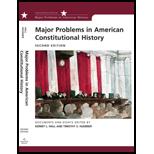 After identifying some of the original volume's utilities and limits, Hadden describes how the second edition is different: "Huebner, an expert on southern judges in both the antebellum and Reconstruction periods, has carefully transformed the two-volume set, pruning down the original 1000 pages by nearly half, to about 560 pages in all. He’s also taken the first edition’s 24 chapters and reduced them to 15."
After identifying some of the original volume's utilities and limits, Hadden describes how the second edition is different: "Huebner, an expert on southern judges in both the antebellum and Reconstruction periods, has carefully transformed the two-volume set, pruning down the original 1000 pages by nearly half, to about 560 pages in all. He’s also taken the first edition’s 24 chapters and reduced them to 15."Hadden offers particular examples of excised material, much coming from the pre-1865 period. She suggests that, "on balance, . . . when cuts were made, economic issues often lost out to topics like race and federalism in the new volume, since they continue to have strong coverage before and after 1865."
Hadden also notes changes to the secondary writing that accompanies the cases:
Every piece of secondary writing in the first edition has been revisited by Huebner, and most have been replaced with newer scholarship that brings students up to date on interpretive controversies and innovative thinking. Daniel Farber and James McPherson debate the merits of Lincoln on civil rights and collective rights. Derrick Bell and Kermit Hall (posthumously) argue the merits of the Brown legacy. John Yoo and Peter Irons duke it out on whether the president has legitimate augmented powers to combat terrorism. Important additions include the voices of Linda Kerber, Jan Lewis, Joan Hoff, and Catherine MacKinnon, who address the role of gender in constitutional interpretation at various points along the way. The secondary literature chosen to illuminate the primary sources in Major Problems is of the highest quality and reveals the fine touch of the editor’s hand.For a fuller account of the changes (including a dozen new cases and revisions to the appendix), consult the full review, available here.